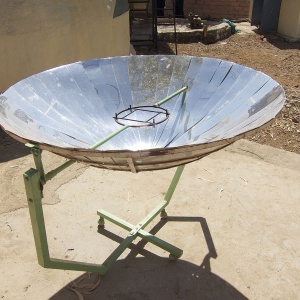
Using home-made solar cookers instead of microwaves could reduce greenhouse gas emissions and electricity use as well as enhance social well-being and motivate people to behave more sustainably, according to this paper, which considers Spain as an example.
The figure below shows the three types of solar cooker considered: box, panel and parabolic.
 Image: Figure 2, Mendoza et al. Examples of the solar cooker designs considered in the study. (a) 30 cm width × 20 cm length × 60 cm height; b) 30 cm width × 40 cm length; c) 140 cm diameter).
Image: Figure 2, Mendoza et al. Examples of the solar cooker designs considered in the study. (a) 30 cm width × 20 cm length × 60 cm height; b) 30 cm width × 40 cm length; c) 140 cm diameter).
Abstract
The sustainability benefits of using solar cookers in developing countries have been analysed widely in the literature. However, the sustainability potential of solar cookers in developed economies has not been explored yet, which is the topic of this paper. Three types of solar cooker – box, panel and parabolic – were built as part of this research, using mostly (>70%) reused household materials. Their life cycle environmental and economic performance was analysed and compared to conventional microwaves. The results were first considered at the level of individual cookers and then scaled up to the levels of a city, region and country, considering a conservative (10%) uptake of solar cookers in substitution of microwaves. The contribution of home-made solar cookers to a circular economy and their social sustainability were also analysed. Spain was used as an illustrative example to demonstrate the potential sustainability benefits of using solar cookers in developed countries. The results suggest that, in comparison with microwaves, they could reduce annual life cycle costs by up to 40% and environmental impacts by up to 65%, including greenhouse gas emissions. At the national level, 42,600 t of CO2 eq. would be avoided annually while the consumption of primary energy would be reduced by 860 TJ. Furthermore, the electricity consumption would decrease by 67 GWh/yr and 4200 t/yr of household waste would be avoided. If solar cookers were built entirely by reusing household materials, up to €23.2 million could be saved per year. Finally, the development of craft activities to build and repair the cookers can help people to engage socially and reduce stress, thus enhancing their social wellbeing. It can also increase people's awareness of a more sustainable use of resources. Therefore, home-made solar cookers represent a promising opportunity to motivate behavioural changes towards a circular economy and sustainability in developed countries.
Reference
Mendoza, J.M.F., Gallego-Schmid, A., Rivera, X.C.S., Rieradevall, J. and Azapagic, A., 2019. Sustainability assessment of home-made solar cookers for use in developed countries. Science of The Total Environment, 648, pp.184-196.
Read the full paper here. See also the Foodsource chapter How can we reduce food-related greenhouse gas emissions?







Post a new comment »